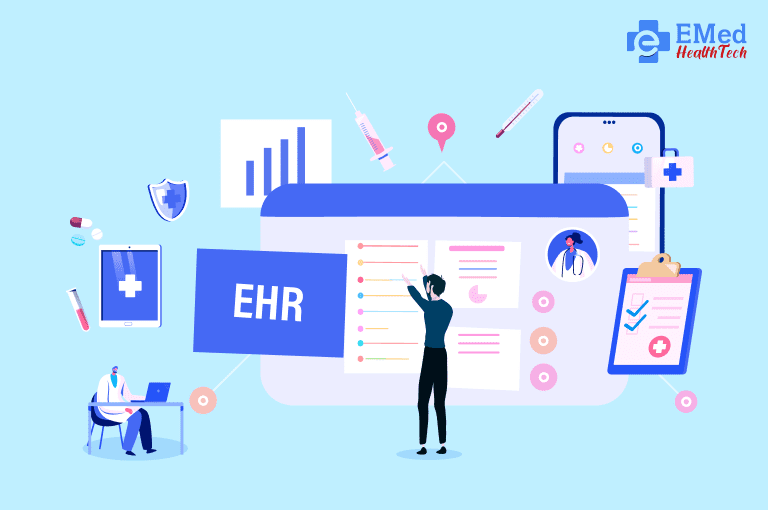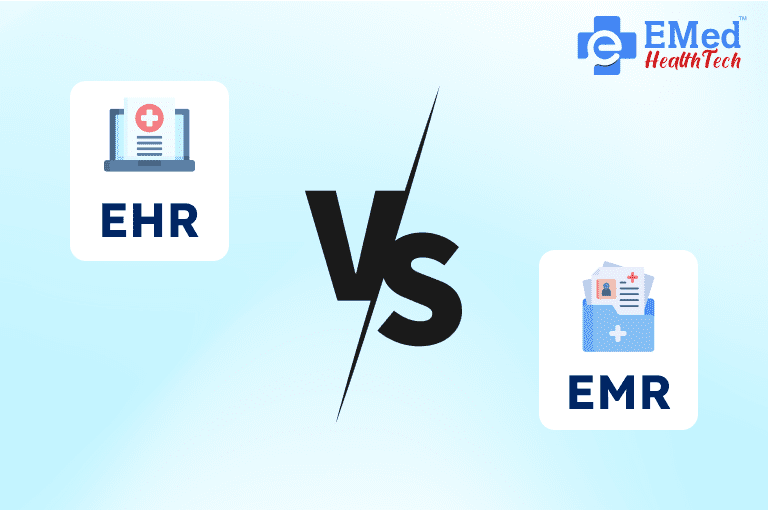In today’s rapidly evolving healthcare landscape, electronic medical records (EMRs) and electronic health records (EHRs) are more than digital versions of paper patient records. These essential elements of EMR/EHR software development help improve medical services’ efficiency, accuracy, and delivery.
These systems have undergone significant transformations recently, influenced by technological advances, regulatory changes, and the need for more dynamic interactions with health data. Looking ahead, integrating new technologies and focusing on improving user experience signal exciting trends that will shape the future of EHR software development.
Technological Advances Driving EMR/EHR Trends
1. Integrating Artificial Intelligence(AI) And Machine Learning (ML)
-> Predictive analytics for patient care and outcomes: AI and machine learning are emerging to revolutionize how data collected from EHR/EMR integration systems is analyzed to predict patient outcomes. This technology allows healthcare providers to detect potential health problems before they become serious, allowing for developing preventative treatment strategies.
-> Automatic diagnosis and treatment recommendation: AI algorithms can suggest possible diagnoses and recommend treatments based on historical data and patterns, increasing the accuracy and timeliness of diagnosis patient care.
2. Increased Use Of Cloud Computing
-> Accessibility and scalability benefits: Cloud-based EMR Software development allows healthcare professionals to securely access medical records from anywhere, anytime, supporting faster and better decision-making.
-> HIPAA Compliance and Security Measures: Cloud solutions still pose serious security concerns despite their convenience. Developers are continually improving data encryption and security protocols to comply with regulations like HIPAA, ensuring patient data is safe from breaches.
3. Applying Blockchain Technology
-> Secure and tamper-proof data exchange: Blockchain offers a promising solution to many privacy and data security problems plaguing today’s EMR/EHR systems. Maintaining a decentralized, tamper-proof record of all patient interactions ensures data integrity.
-> Blockchain for Patient Data Privacy and Interoperability Case Studies: Various pilot projects are exploring blockchain to improve patient data privacy and interoperability, Combining different healthcare systems, suggesting a trend for broader adoption in the future.
Improve User Interface And Experience
Focus On Mobile Solutions First
-> Mobile application development: Moving to mobile solutions in EMR/EHR mobile development systems facilitates remote patient monitoring and real-time data access, transforming care delivery outside the traditional clinical setting.
-> Impact on patient engagement and continuity of care: The mobile app improves patient engagement by providing direct access to their health records and facilitating communication with healthcare providers, leading to better management of chronic diseases and overall health.
Improving Interoperability
-> Challenges related to seamless data flow: Despite progress, achieving seamless interoperability between disparate healthcare systems remains challenging. The goal is to establish a unified system capable of effectively exchanging information, thereby minimizing redundancy and errors.
-> The role of standards such as FHIR: Initiatives such as the Fast Healthcare Interoperability Resource (FHIR) are essential for developing frameworks that support better data-sharing capabilities across different systems.
-> Personalizing healthcare Customizable interfaces for different roles: EHR/EMR integration systems increasingly have customizable user interfaces to meet the specific needs of other healthcare providers, thereby improving efficiency.
-> Tailored Patient Portal: Enhancements to the patient portal that allow patients to personalize interactions with their health data can significantly improve satisfaction and engagement work.
Regulatory Impact And Compliance Challenges
-> Overview of global regulatory changes: With global initiatives such as the General Data Protection Regulation (GDPR) in Europe and changes in healthcare policy in the United States, operators’ Regulatory regulations continually shape the development and use of EMR/EHR software development systems.
-> Compliance is the driving force in software development: Developers must ensure that the EMR/EHR system not only complies with current regulations but can also adapt to future changes. This includes data collection and storage, audit tracking, and sharing.
-> Future regulatory trends and their expected impact: Anticipating and preparing for future regulatory changes through scalable design and flexible functionality will be essential for the EMR/EHR platform to stay relevant and compliant.
The Future Role Of Telemedicine In EMR/EHR Systems
EHR/EMR mobile app development systems increasingly integrate telemedicine features, allowing providers to deliver care remotely. This integration becomes necessary as telemedicine becomes a significant part of modern healthcare practice.
Healthcare businesses will be able to reinvent healthcare delivery with the aid of EHR and EMR trends. Healthcare practitioners may need to access patient records and reports through a secure network that is only accessible by authorized individuals in the not-too-distant future.
In the upcoming years, trends in EHR and EMR will be crucial for the healthcare sector. For healthcare companies to guarantee that their patients are receiving the best care possible, they must constantly monitor changes and stay up to date with new technology innovations.
Challenges And Opportunities In Healthcare
Integrating telemedicine involves overcoming significant technical barriers, including ensuring reliable video communication and data exchange. Telemedicine integrated with EHR/EMR mobile app development systems has the potential to significantly expand access to healthcare services, especially in rural and underserved areas.
EMRs are required to be compatible with other EMR systems, and they typically integrate less with these systems. All patient concerns are addressed by the overall idea of Electronic Health Records (EHR), which also facilitates patients’ access to information when needed. Interoperability is the one characteristic that separates EMR and EHR, despite the fact that there are no appreciable differences between them.
The growth of EMR and EHR has been aided by the rise of cloud computing, blockchain technology, and standardization. Maintaining documents that are current, safe, and easily accessible has never been simpler.
Takeaway
The future of EMR/EHR software development is bright, with technological innovations paving the way for more efficient, secure, and user-friendly systems. These advances will improve the functionality of EHR systems and significantly change the healthcare landscape.
Going forward, the focus will likely remain on improving interoperability, adopting cloud and AI technologies, and ensuring compliance with evolving global regulations. With these developments, EMR/EHR systems will continue to play an important role in shaping the efficiency and effectiveness of healthcare delivery worldwide.
EMed Healthtech, one of the leading EMR/EHR software development service providers has a team of experienced and skilled EHR/EMR software developers offering top-notch healthcare solutions tailored to your needs.











